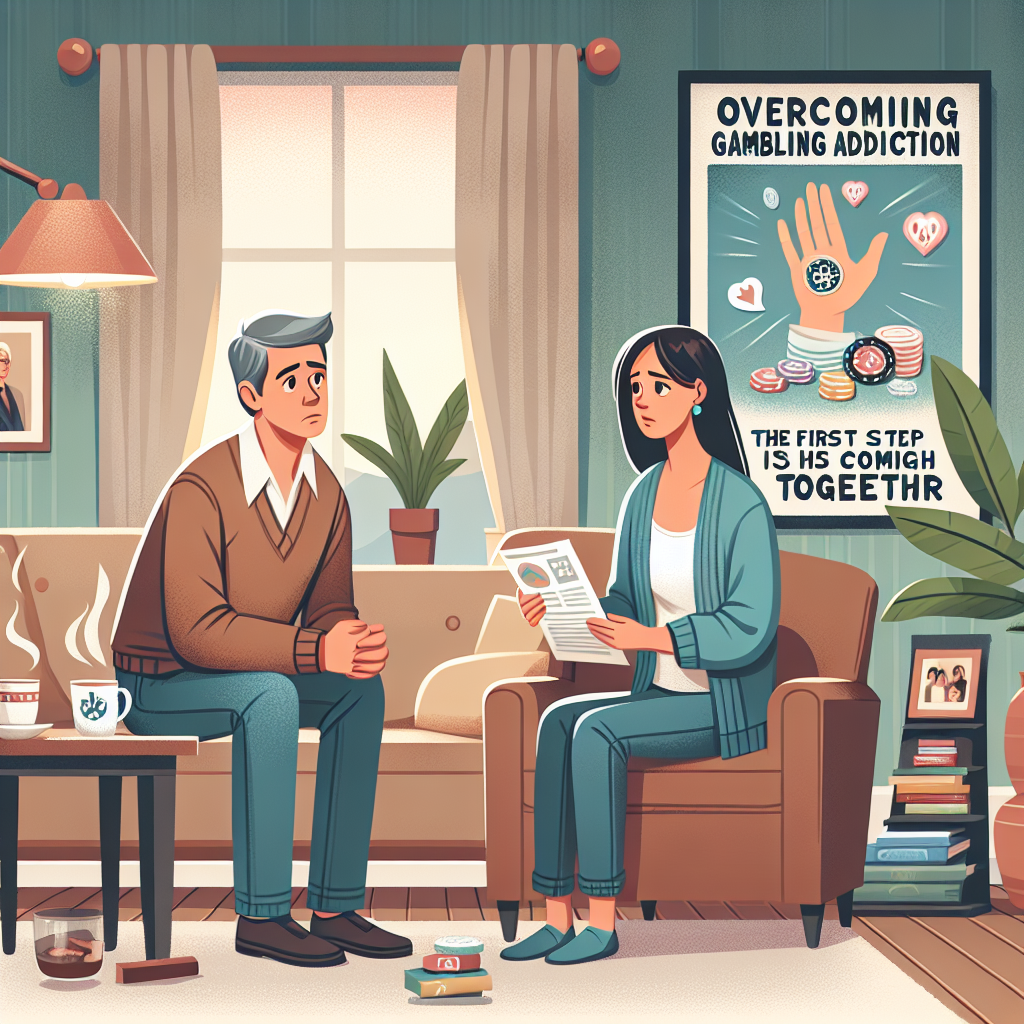-
Table of Contents

“Support Their Journey: Encourage Healing Through Gambling Addiction Therapy”
Introduction
Encouraging a loved one to attend gambling addiction therapy can be a delicate and challenging process, but it is crucial for their well-being and recovery. Gambling addiction, also known as compulsive gambling or gambling disorder, can have devastating effects on an individual’s financial stability, relationships, and mental health. The first step in helping a loved one is to approach the situation with empathy, understanding, and a non-judgmental attitude. It is important to educate yourself about the nature of gambling addiction and the available treatment options. Open and honest communication is key; express your concerns calmly and provide specific examples of how their gambling behavior has impacted their life and those around them. Offer your support and encourage them to seek professional help, highlighting the benefits of therapy and the possibility of regaining control over their life. Additionally, it may be helpful to involve other family members or friends in the conversation to show a united front of support. Remember, the goal is to motivate and support your loved one in taking the first step towards recovery, while respecting their autonomy and readiness to seek help.
Effective Communication Strategies to Encourage a Loved One to Attend Gambling Addiction Therapy
Encouraging a loved one to attend gambling addiction therapy can be a delicate and challenging task. It requires a blend of empathy, understanding, and effective communication strategies to ensure that the message is conveyed in a supportive and non-judgmental manner. The first step in this process is to educate yourself about gambling addiction. Understanding the signs, symptoms, and consequences of this addiction will enable you to approach the conversation with a well-informed perspective. This knowledge will also help you to empathize with your loved one’s struggles and provide them with the necessary support.
When initiating the conversation, it is crucial to choose an appropriate time and setting. A private, calm environment where both parties feel comfortable can significantly impact the outcome of the discussion. Begin the conversation by expressing your concerns in a non-confrontational manner. Use “I” statements to avoid sounding accusatory. For example, you might say, “I’ve noticed that you’ve been spending a lot of time gambling, and I’m worried about how it’s affecting you.” This approach focuses on your feelings and observations rather than placing blame on your loved one.
Active listening is another essential component of effective communication. Allow your loved one to share their thoughts and feelings without interruption. Show empathy by acknowledging their emotions and validating their experiences. Phrases like “I understand that this is difficult for you” or “It sounds like you’re feeling overwhelmed” can help to build trust and rapport. By demonstrating that you are genuinely interested in their well-being, you create a safe space for open and honest dialogue.
It is also important to provide specific examples of how gambling has negatively impacted their life and the lives of those around them. Be gentle but honest in highlighting these consequences. For instance, you might mention financial difficulties, strained relationships, or declining mental and physical health. By illustrating the tangible effects of their addiction, you help your loved one to recognize the severity of the situation and the need for professional help.
Offering support and encouragement is vital in motivating your loved one to seek therapy. Reassure them that seeking help is a sign of strength, not weakness. Emphasize that therapy can provide them with the tools and strategies needed to regain control of their life. You might say, “I believe in you, and I know that with the right support, you can overcome this challenge.” Additionally, offer to assist them in finding a suitable therapist or support group. This gesture demonstrates your commitment to their recovery and can alleviate some of the anxiety associated with seeking help.
It is also beneficial to set boundaries and establish consequences if your loved one refuses to seek help. While this may seem harsh, it is essential to protect your own well-being and prevent enabling their addiction. Clearly communicate your boundaries and the reasons behind them. For example, you might say, “I can’t continue to lend you money if you’re not willing to get help for your gambling problem.” This approach underscores the seriousness of the situation and reinforces the importance of seeking therapy.
Lastly, be patient and persistent. Change is a gradual process, and your loved one may need time to come to terms with their addiction and the need for therapy. Continue to offer your support and encouragement, and remind them that you are there for them every step of the way. By employing these effective communication strategies, you can inspire your loved one to take the first step towards recovery and a healthier, more fulfilling life.
Creating a Supportive Environment for a Loved One to Seek Gambling Addiction Therapy
Encouraging a loved one to attend gambling addiction therapy can be a delicate and challenging task, but creating a supportive environment is crucial for their journey towards recovery. The first step in fostering this supportive atmosphere is to approach the subject with empathy and understanding. Recognize that gambling addiction is a complex issue that often involves deep-seated emotional and psychological factors. By showing compassion and avoiding judgment, you can help your loved one feel safe and understood, which is essential for them to consider seeking help.
Open communication is another vital component in creating a supportive environment. Initiate a conversation at a time when both of you are calm and free from distractions. Express your concerns in a non-confrontational manner, using “I” statements to avoid sounding accusatory. For example, you might say, “I’ve noticed that you seem stressed lately, and I’m worried about how gambling might be affecting you.” This approach can help your loved one feel less defensive and more open to discussing their struggles.
Listening actively is equally important. Allow your loved one to share their feelings and experiences without interrupting or offering immediate solutions. Sometimes, simply being heard can be incredibly validating and can pave the way for more in-depth discussions about seeking therapy. Show that you are genuinely interested in their well-being by asking open-ended questions and reflecting on what they say. This can help them feel more comfortable and understood, making them more likely to consider your suggestions.
In addition to open communication, providing practical support can make a significant difference. Research and gather information about gambling addiction therapy options, including local therapists, support groups, and online resources. Presenting this information in a non-pressuring way can help your loved one see that help is available and accessible. You might say, “I found some resources that might be helpful if you ever decide you want to talk to someone about what you’re going through.”
Encouraging a loved one to attend therapy also involves being patient and persistent. Change often takes time, and your loved one may not be ready to seek help immediately. Continue to express your support and concern without pushing too hard. Gentle reminders and consistent encouragement can gradually help them see the benefits of therapy. For instance, you could periodically check in and ask how they’re feeling or if they’ve thought more about seeking help.
Creating a supportive environment also means taking care of yourself. Supporting someone with a gambling addiction can be emotionally draining, and it’s essential to maintain your own well-being. Seek support from friends, family, or a therapist to help you cope with the stress and emotions that may arise. By taking care of yourself, you’ll be better equipped to provide the ongoing support your loved one needs.
Lastly, celebrate small victories and progress. Acknowledge and praise any positive steps your loved one takes towards addressing their gambling addiction, no matter how minor they may seem. Positive reinforcement can boost their confidence and motivation to continue their journey towards recovery.
In conclusion, creating a supportive environment for a loved one to seek gambling addiction therapy involves empathy, open communication, practical support, patience, self-care, and positive reinforcement. By fostering a compassionate and understanding atmosphere, you can help your loved one feel safe and encouraged to take the crucial step towards therapy and recovery.
Q&A
1. **Question:** What are some effective ways to approach a loved one about attending gambling addiction therapy?
**Answer:** Approach the conversation with empathy and without judgment, express your concerns about their well-being, provide specific examples of how their gambling has affected them and others, and offer to help them find and attend therapy sessions.
2. **Question:** How can you support a loved one who is hesitant to attend gambling addiction therapy?
**Answer:** Offer emotional support and reassurance, provide information about the benefits of therapy, suggest starting with a single session to see how it goes, and consider attending a support group together to show solidarity.
Conclusion
Encouraging a loved one to attend gambling addiction therapy involves expressing genuine concern, providing information about the benefits of therapy, and offering emotional support. It’s important to approach the conversation with empathy, avoid judgment, and be patient, as the decision to seek help must ultimately come from the individual. By creating a supportive environment and highlighting the positive changes that therapy can bring, you can help your loved one take the first step towards recovery.



